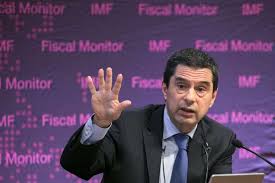Nigeria and other African countries taking loans from China must ensure that the terms of borrowing are strictly in conformity with the Paris Club arrangements, the International Monetary Fund (IMF) said Wednesday.

It also recommended that Nigeria should embark on comprehensive tax reforms as a way to boost non-oil revenue generation.
The Washington-based institution, in the latest edition of its ‘Fiscal Monitor report,’ also ranked Nigeria as the second worst country in the world in the utilisation of its Sovereign Wealth Funds (SWF).

Presenting the Global Financial Stability Report at the ongoing IMF/World Bank Spring Meeting in Washington DC, the Financial Counsellor and Director, Monetary and Capital Markets Department, IMF, Mr. Tobias Adrian, argued that financial transactions between benefitting African countries and China does not usually align with the Paris Club arrangements.
He said while such funding was needed for development, putting it to productive use remains an essential factor.
He said: “Lending and capital flows from China are of course important for development; on the one hand, what is very important in those lending arrangements are the terms of the loans.
“And we urge countries to make sure that when they borrow from abroad, that the terms are favourable for borrowers. In particular, we tend to recommend that loans to countries should be conforming to Paris Club arrangements. And that is not always the case in the case of loans from China.”
Also commenting on probity in the management of such loans, which he said the IMF is always focused on, he noted that: “Good governance is very important in making sure that capital flows are channelled to productive sources.”
He added: “Nigeria has been borrowing in international markets, but we worry about rollover risks going forward. On the other hand, this is very good because it allows the country to invest more.
“At the moment, funding conditions in economies such as Nigeria and other sub Saharan African countries are very favourable, but that might change at some point. However, there is the risk of whether these needs for refinancing can be met in the future.”
Adrian said the GFS report provides an in-depth analysis of a number of specific vulnerabilities, adding that in advanced economies, corporate debt and financing risk taking have increased.
“The credit worthiness of borrowers has deteriorated. So-called leveraged loans to highly indebted borrowers continue to be of particular concern. In the Euro area, fiscal challenges remain in countries that have worries about the sovereign financial sector nexus. If sovereign yields were to rise sharply, banks with large holdings of debts could face significant loses. Insurance companies could also face loses on their bond portfolios,” he added.
He said the report showed that this was the time for decisive policy actions since vulnerabilities were increasing in a number of countries, adding that there was no more room for complacency.
“The intensification of trade tensions and a threat to disorderly practices have dented investors’ confidence. Policy makers should resist inward-looking policies, avoid policy missteps and resolve policy uncertainties.”
He also called on policymakers to ensure post crisis regulatory reform was fully implemented, adding that they should resist calls for rolling back reforms.
“Policy makers should develop and deploy macro-prudential tools which can mitigate vulnerabilities and make the financial system more resilient,” he added.
He also called on emerging markets making volatile capital flows to limit their reliance on short term overseas debt and they should ensure they have adequate foreign currency reserves and bank buffers. He also called for monetary policies to be data dependent and well communicated.
“Policy makers should act decisively to renew their commitment to open trade, to discourage the build-up of debt and to communicate clearly any shifts in monetary policy. In the maturing credit cycle farsighted policy actions to reduce vulnerabilities can help avoid more painful adjustments in the future,” he said.
On his part, the Deputy Director, Monetary and Capital Markets Department, IMF, Fabio Natalucci, said it was of concern that the global economy is slowing down with market gyration over the last six months affecting risk assets, adding that this has raised investor concerns about the health of the corporate sector.
“If there is a severe slowdown in the growth of the global economy, then it could be a problem for some firms, particularly because credit quality has declined, underwriting standards are weaker and debt levels are much higher,” he said.
In a related development, IMF has recommended that Nigeria should embark on comprehensive tax reforms as a way to boost non-oil revenue generation.
The Director, Fiscal Affairs Department, IMF, Mr. Vitor Gasper, told journalists during a media briefing at the IMF/World Bank Spring Meeting on Wednesday that the body strongly recommend tax reforms to Nigeria.
According to him, “Tax reform in Nigeria is a very important issue and one of our main recommendations for Nigeria is the need for a comprehensive tax reform that would sustainably increase non-oil revenue. And the reason why that is needed is that Nigeria has one of the lowest ratios of non-oil revenue-to-GDP at around 3.4 per cent in the world. And total tax revenue-to-GDP at around 8 percent is also very low compared to its peers.
“Because of that, then, the interest-to-tax ratio – because the tax is so low – is high. And so a lot of the tax is crowded out – not being able to be spent on important development needs. And does Nigeria have those needs? Of course, big time; as you know, the needs for infrastructure and for spending on human capital are very large.”
Speaking on other areas beside the VAT, Gasper noted that “There is an emphasis also on improving excise taxes. And I think there have been some steps in that direction, but there is scope for expanding the coverage of excises to other goods and also higher rates on excises.”
According to him, “Another important area is aggressive streamlining of tax incentives and exemptions. So there has been in Nigeria an effort with the strategic revenue growth initiative, looking at a comprehensive approach to tax reform, and this is very welcome.”
Ranks Nigeria Low in SWF Utilisation
The Fund in its Fiscal Monitor report, stated that Qatar was the only country worse than Nigeria on its SWF Index.
It stated: “It is critical to develop a strong institutional framework to manage these resources—including good management of the financial assets kept in sovereign wealth funds—and to ensure that proceeds are appropriately spent.
“This remains a significant challenge in many resource-rich countries that, on average, have weaker institutions and higher corruption.
“The governance challenges of commodity-rich countries— that is, the management of public assets— call for ensuring a high degree of transparency and accountability in the exploration of such resources.
“Countries should develop frameworks that limit discretion, given the high risk of abuse, and allow for heavy scrutiny.”
Kindly follow us on twitter:@AfricanVoice2








